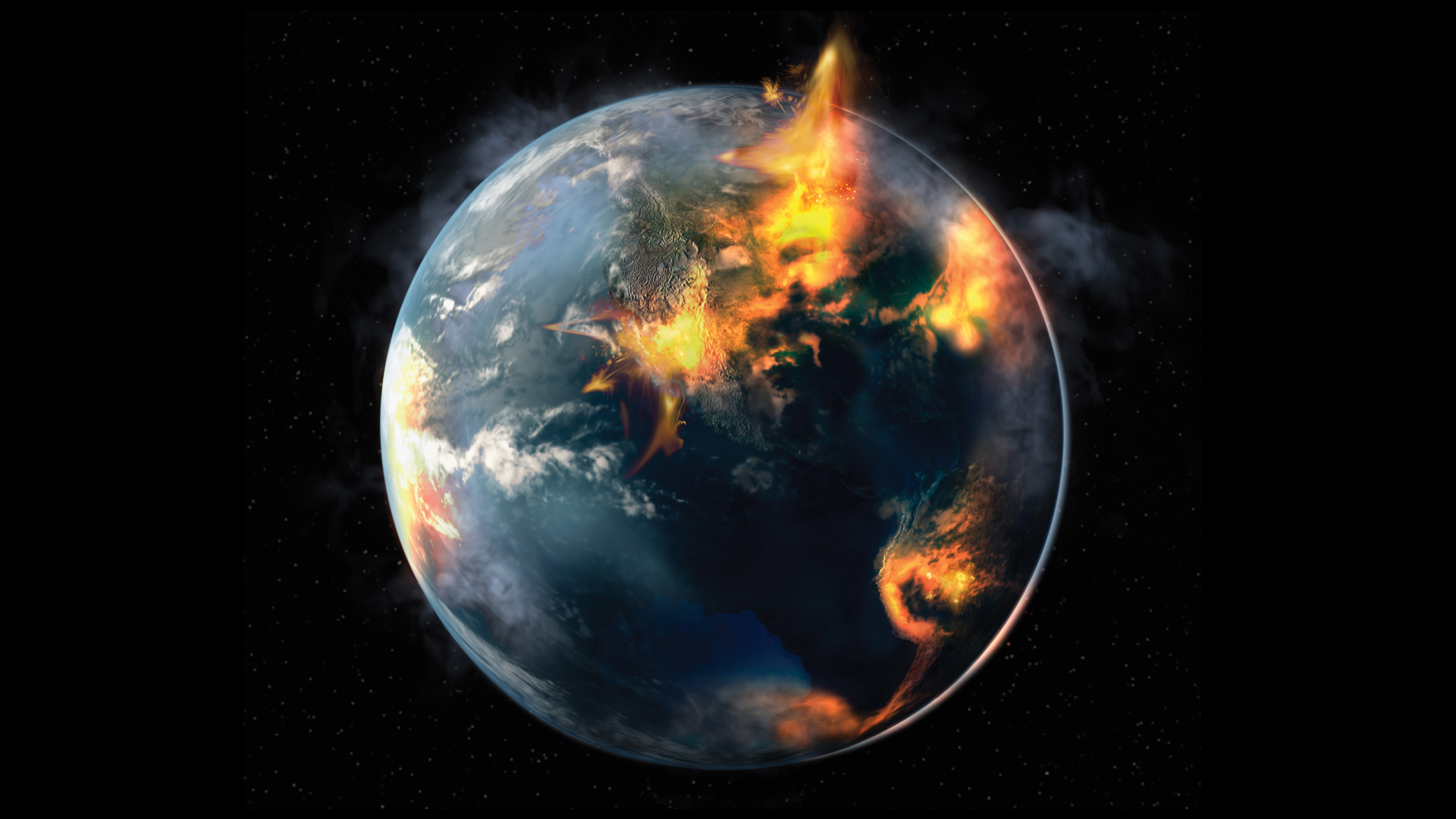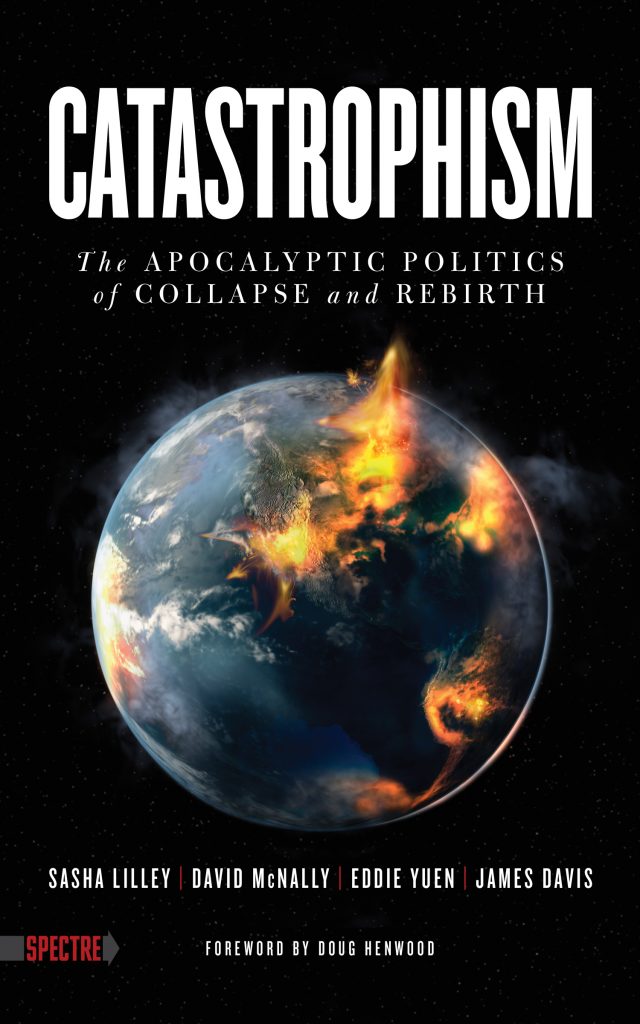by Jane Shallice
Socialist Resistance
January 21st, 2013
Over
the last twenty or thirty years there have been a constant litany of
the latest life threatening scares. For an older generation growing up
in the postwar period, the threat was nuclear war, with its “four minute
warning”. In the USA there appeared a more hysterical response to
their Cold War with photographs of school children practicing hiding
under desks or seated covering their eyes with their hands as some type
of protection from a nuclear blast.
Although no longer discussed
as a present and immanent threat to our lives, the huge quantities of
nuclear weapons presently stored and maintained, (and with more
planned), the nuclear threat is still a distinct possibility, whether
from war or accident. But over time this has given way to other
catastrophes’, with the emergence of a world exposed to an ever-growing
sequence of possible disasters: Aids, Avian Flu, SARS or another mutant
strain of some disease, peak oil, GM and Frankenstein foods, the
millennium bug, cloning, terrorism, global warming and climate change.
At present responses to the American, now global, financial crisis
whilst not being seen as a preoccupation with the end times, does
dominate immediate political questions.
Catastrophism is
a collection of essays analysing the obsession with a doom laden future
and arguing that whether the left, the right or environmentalists, many
have succumbed to an unremitting pessimism and helplessness. For the
contributors, the world appears “saturated with instrumental, spurious
and sometimes maniacal versions of catastrophism – including right wing
racial paranoia, religious millenarianism, liberal panics over fascism,
leftist fetishization of the capitalist collapse”. They have as their
essential locus that such a confirmation and acceptance of an
apocalyptic future, paralyses and prevents any way of challenging what
is popularly assumed to be the inevitable. The response in the book
reassert the essential requirements of thinking and undertaking actions
which return us to the everyday; “to the idea that revolution grows out
of the ordinary prosaic acts of organizing and resistance whose
coalescence produces a mass upheaval” and the necessity of those
“decidedly mundane activities – strikes and demonstrations meetings
speeches leaflets and occupations”. Understanding that “capitalism
itself is catastrophic”, it being both crisis ridden and crisis
dependent, implies that we should not take for granted “the grinding
quotidian catastrophe of capitalism during times when we are faced with
exceptional calamities”.
The arena in which we have to act
As
for many on the left, having lived with Rosa Luxembourg’s warning of
“Socialism or Barbarism”, foolishly I have always thought of this as a
warning about the future. I was shocked therefore on reading in an
obituary for Daniel Bensaid, that by the mid 90s with the success of
neoliberalism, he thought that we were indeed experiencing barbarism.
But throughout history, for vast numbers of people barbarism could be
the only designation of all they experienced – slavery, fascism,
terrifying and unremitting poverty and genocide. However barbarism is
not the apocalypse, it is not the end times; it is the arena in which we
have to act, working for another possible future.
The authors of Catastrophism
argue that many of the false ecological prophesies around
overpopulation and resource depletion flow directly from Malthusian
theory, that “ crudest most barbarous theory that ever existed, a system
of despair.” (Engels) But the current ecological crisis dominating
today’s thinking means we cannot ignore the supreme logic of the
scientific data and the clear trajectory that it indicates. A consensus
of scientists indicates the serious questions that have to be addressed
and unless there is a substantial change in human behaviour, there will
be a progressive collapse of known ecological systems. We are not helped
by many proposed solutions being offered, they being patently
completely inadequate. (After the debacle in Copenhagen 2009 public
concern over climate plummeted to 22 out of possible 22 global issues).
Whilst knowing solutions can only be found when the world system of
accumulation and growth is changed, and the terrifying but
understandable refusal of governments to confront the real issues
reveals the major contradiction: how to get this political system to
even modestly constrain capital. It would appear that we have to
organize to curb the worst excesses, through regulation and limitations
on the actions of capital, whilst knowing this is not the answer.
In his essay The Politics of Failure has Failed,
Eddie Yuen considers some of the environmentalist arguments, at the
extreme end of which are the anti-civilization movements, who in the
name of liberation assert that alienation is endemic to civilization
itself. For them our only political choice would be to reject all that
we know, abandoning urban structures, work and all which is the stuff of
people’s lives.
Walls and fences
With
the dangers of global warming, changing climatic patterns and a
consequent rise in sea level, large numbers of major cities will be in
danger of flooding. Many will become uninsurable – New York, London,
Shanghai, which will radically impact on the financial world. But as
all studies of climate change are stating, from such well known green
institutions such as the World Bank, the International Energy Agency and
Price Waterhouse Coopers, major changes in both temperature and
precipitation, especially in areas girdling the tropics, will experience
increased desertification, consequent soil impoverishment and
catastrophic migrations will be the increasing pattern. With no basic
food security and increasing immiseration, the northern states will
respond with walls and fences and authoritarian solutions of
surveillance and control. In Planet of Slums, Mike Davis tells of the
projects of the US military planning to control urban areas with drones
and surveillance, and evidence from the USA/Mexico demonstrates the
sealing of that border using the latest military technology, has already
been accomplished.
Whilst all points to cascading environmental
disaster, Yuen argues that any movement to counter it has to be rooted
in networks of communities and activists and requires a positive appeal
to community actions and a compassionate egalitarian radical movement –
like the networks of the global justice movement. But he does not
consider that it is also necessary to raise demands upon the state,
which is the only way in which adequate policies can be implemented.
Without such a strategy the dilemma of what David Harvey calls “termite
politics” is raised, whereby political activity makes small gains and
yet refuses to engage with the question of the state itself.
In Great Chaos under Heaven,
Sasha Lilley considers the catastrophism of the left that she argues
lies in political despair. “Irresistible economic forces lead with the
certainty of doom to the shipwreck of capitalist production. The
substitution of a new social order for the existing one is no longer
simply desirable it has become inevitable”. Marx never argued that the
collapse of capitalism was inevitable. “History does nothing, it
possesses no immense wealth, it wages no battles…It is man, real, living
man who does all that , who possesses and fights; history is not , as
it were, a person apart, using man as a means to achieving its own aims;
history is nothing but the activity of man pursuing his aims”.
An
alternative pole found in the political left is the mentality of “the
worse it gets, the better for revolutionaries”. Characterised by the
Weathermen and the urban guerilla movements, like the RAF, in the 60s
and 70s. “The liberatory hopes of the past and their confidence in the
collective power of others have given way to the uncertain hope and fear
of collapse, befitting our anti-utopian and crisis fraught times.”
All the bugbears of the right are on display in James Davis’s essay on Catastrophism
and the Right. For them society, as we know it, is under attack from
immigration, Islam, women’s liberation of peoples, multi-culturalism.
In the USA there is a spectacular display of the populist right, who
have taken a central role in the organizing of the more extreme rightist
positions in the political spectrum and which have a large influence in
sections of popular consciousness. Following the millenarians of the
19th century, communism and secularism and later multiculturalism were
seen as catastrophic dangers to the American way of life, which is
identified as freedom and liberty. In the fifties, figures like Billy
Graham, who trailed through Britain expounding the dangers of sex and
drugs and rock and roll and anything liberatory, was given a huge
audience within the context of the Cold War. Jerry Falwall and Pat
Robertson opposing women’s liberation and gay rights used private
television channels to drive the message home: the security of the state
would be ensured by the family, patriarchy, morality, monogamy,
authority and the free market. The enemy for them is democracy and
equality and their response has been to elevate the individual swimming
against tides of mediocrity.
Davis identifies their eugenicist
underpinnings, with their assertion that multi ethnic populations will
create a dilution of a nation’s intellectual qualities. We have seen
this in sections of the Tea Party, as well as in rightist and neo
fascist developments throughout Europe. A supreme example is that of
Anders Breivik, influenced it was revealed by writings of even such as
Melanie Phillips amongst others. “Post cold war i.e. after communism the
rudders are the fantasy of Islam or Latin American degeneration. … The
existential threat of Islam is of course immediate and will be seen to
have won “in our lifetime”.
The state has always used repression to fight social movements that promote an expanding democratic agenda, and while the right attacks the state as liberal, the state responds with harsh measures previously off limits e.g. over immigrants. But Davis extends this to encompassing the way in which exceptional events permit the introduction of vicious and antidemocratic measures. The whole war on terror was such an example, and one which was adopted not only within the USA but which became a template for all the “developed” world. Within that context there was “an exchange of social and political freedoms for freedom from fear” whereas there was no such limitation on the impact of neoliberal policies, which had been globally adopted wholesale through the last twenty years, with all the concomitant fears and insecurity for people who rely on their labour power.
For the essay by David McNally, Land of the Living Dead, the status quo is indeed itself the catastrophe. Looking at film and fantasy fiction with their plethora of zombies and vampires, he develops the argument that such imagery stems from the origins of capitalism and the exploitation of labourers, forced to sell their labour power, “sapping away all their lives and becoming almost zombies”. He focuses on the way the zombie is viewed in Haiti, a figure without memory, without self consciousness or agency. The denial therefore of all that is human. Considering the impact of neoliberal policies throughout Latin America and Africa, it is only too apparent that structural adjustment programes have exacerbated all that was dehumanizing. But he then offers liberation – through the living dead re-emerging as the rebellious. Emphasising that there is no catastrophic collapse, which would herald the new dawn, he returns, like the other contributors to the answer being “decidedly mundane activities – strikes and demonstrations meetings speeches leaflets and occupations”.
This is an important book, which emphasizes and confirms the old methods, ones which may not have proved successful in the past but which none the less are the methods of analyzing, agitating and organizing. Whilst recognizing that these are hard times and there are few developments which signal a glorious future, we have seen the impact of Occupy, of landless movements, and of an economic and political crisis that places capitalism as a system which has failed and has to be replaced. The question as ever is how this will be achieved.
Back to Sasha Lilley’s Author Page | Back to David McNally’s Author Page | Back to Eddie Yuen’s Author Page | Back to James Davis’s Author Page







